When we feel angry, it’s not always easy to find the right words to describe our emotions. Using the same word repeatedly can sound too strong, blunt, or emotionless. That’s why learning other ways to say “angry” can help you express yourself more clearly and gently. Whether you’re writing a message, talking with someone close, or expressing feelings at work, choosing the right synonym for “angry” can make your words feel more caring, thoughtful, and human.
What Does “Angry” Mean?
The word “angry” means feeling upset, annoyed, or frustrated because of something that went wrong or didn’t meet your expectations. It’s a natural human emotion that shows something important to you has been hurt, ignored, or misunderstood. Being angry doesn’t always mean shouting — sometimes it’s quiet, heavy, or even mixed with sadness. Understanding the emotion helps you express it more kindly and respectfully.
Is It Professional/Polite to Say “Angry”?
Yes, “angry” is a neutral and acceptable word, but in professional or sensitive settings, it can sound a bit harsh. If you’re communicating with coworkers, clients, or loved ones, it’s often better to choose softer or more specific alternatives like “upset,” “frustrated,” or “disappointed.” Using these alternatives shows emotional intelligence, maturity, and care for the feelings of others — especially when the goal is to express emotion without causing tension.
Synonyms for “Angry”
Annoyed
Irritated
Frustrated
Upset
Mad
Furious
Enraged
Infuriated
Exasperated
Agitated
Cross
Heated
Livid
Outraged
Displeased
Vexed
Provoked
Indignant
Hostile
Irate
1. Upset
Meaning: Feeling emotionally disturbed, sad, or uneasy because something didn’t go as expected.
Scenario: When someone feels disappointed or emotionally shaken rather than furious.
Tone: Gentle, emotional, and understanding.
Examples:
- I was really upset when I heard what happened between you two.
- She seemed upset after reading that message.
- I didn’t mean to make you upset with my comment.
- It’s okay to feel upset sometimes when things don’t work out.
- He looked genuinely upset, not angry — just hurt.
Explanation: The word “upset” is a kinder and softer way to express anger or disappointment. It acknowledges emotional pain without sounding harsh. You can use it when you want to sound empathetic or caring, especially in personal or professional conversations.
2. Frustrated
Meaning: Feeling annoyed or disappointed because something is not working or improving despite your effort.
Scenario: When someone has tried hard but faces repeated obstacles or misunderstandings.
Tone: Professional, calm, and slightly emotional.
Examples:
- I’m really frustrated with how slow this project is moving.
- She sounded frustrated after dealing with so many delays.
- It’s normal to feel frustrated when things don’t go as planned.
- He’s not mad, just a bit frustrated with the outcome.
- I felt frustrated, but I know we’ll get through this.
Explanation: The word “frustrated” focuses more on problems or challenges than on emotional outbursts. It’s a great option for expressing mild anger in a professional or respectful way, showing that you’re managing your feelings and seeking solutions rather than blaming others.
3. Irritated
Meaning: Feeling slightly angry or annoyed because of something small or repetitive.
Scenario: Used when a person is annoyed by constant noise, delays, or small mistakes.
Tone: Polite, controlled, slightly sharp but not harsh.
Examples:
- I’m a bit irritated by how long we’ve been waiting.
- She gets irritated when people interrupt her while speaking.
- It’s okay to feel irritated sometimes — you’re only human.
- He sounded irritated, but I know he didn’t mean to snap.
- The delay really irritated everyone in the meeting.
Explanation: “Irritated” is a low-level form of anger. It’s perfect when you want to express that something bothered you but not to an extreme degree. It keeps your tone polite, professional, and emotionally balanced.
4. Annoyed
Meaning: Feeling bothered or slightly angry because of a person, situation, or repeated issue.
Scenario: When something keeps interrupting your peace or attention.
Tone: Mild, straightforward, and easygoing.
Examples:
- I’m a bit annoyed by how loud the noise is today.
- She looked annoyed when the call dropped again.
- I didn’t mean to make you annoyed; I was just trying to help.
- He felt annoyed, but he still handled it calmly.
- It’s natural to get annoyed sometimes when things go wrong.
Explanation: “Annoyed” is one of the most common and friendly alternatives to “angry.” It helps you show that you’re a bit bothered without exaggerating the emotion. It’s suitable in both personal and workplace conversations, keeping your tone light but clear.
5. Agitated
Meaning: Feeling emotionally disturbed, uneasy, or unsettled due to stress or conflict.
Scenario: When someone is upset, restless, or overwhelmed by tension.
Tone: Emotional, expressive, and slightly formal.
Examples:
- He seemed really agitated after hearing the bad news.
- She was too agitated to focus on the conversation.
- I get agitated when people raise their voices during discussions.
- The argument left everyone feeling agitated and confused.
- Please calm down — you sound a bit agitated right now.
Explanation: “Agitated” combines both emotional and physical restlessness. It’s stronger than “upset” but less harsh than “furious.” You can use it when someone appears deeply emotional or troubled, especially in sensitive situations where empathy matters.
6. Mad
Meaning: Feeling strong annoyance, anger, or irritation toward someone or something that caused hurt or frustration.
Scenario: Used when expressing straightforward anger, often in casual or emotional settings.
Tone: Casual, emotional, and direct.
Examples:
- I was really mad when I found out they forgot my order again.
- She’s mad because nobody listened to her opinion in the meeting.
- I’m not mad at you, just disappointed about what happened.
- He looked mad, but deep down he was just hurt.
- It’s okay to be mad; it shows that you care about what happened.
Explanation: The word “mad” is one of the most common and natural ways to express anger. It’s often used in everyday speech and can sound less formal than “angry.” It fits well in friendly or emotional conversations but might sound too casual for professional settings. It shows real, raw emotion and helps you speak honestly about what’s bothering you.
7. Furious
Meaning: Feeling extremely angry, often to the point of strong emotional outburst or loss of calm.
Scenario: Used when someone is deeply offended, betrayed, or feels a great injustice.
Tone: Intense, emotional, and passionate.
Examples:
- She was absolutely furious when she found out about the mistake.
- I was furious that they didn’t take responsibility for their actions.
- He looked furious, but he kept his voice calm and steady.
- They were furious about how unfairly they were treated.
- I’d be furious too if that happened to me — that’s completely understandable.
Explanation: “Furious” expresses the highest level of anger but can still be used thoughtfully. It works well when describing deep emotional reactions or serious frustrations. When used carefully, it can show empathy — for example, acknowledging that someone’s anger is justified. It’s strong but not rude when expressed with understanding.
8. Displeased
Meaning: Feeling unhappy, dissatisfied, or mildly angry about someone’s behavior or a situation.
Scenario: Common in formal or professional contexts when you need to sound respectful but firm.
Tone: Polite, formal, and controlled.
Examples:
- The manager was displeased with how the report was handled.
- She looked displeased, though she didn’t say much.
- I was a bit displeased with the service today, to be honest.
- He sounded displeased, but he remained professional throughout.
- They were clearly displeased, and I understand why.
Explanation: “Displeased” is a gentle and polite word for expressing anger or disappointment. It’s especially suitable in workplace communication or formal writing. It shows maturity, self-control, and respect — even when you’re not satisfied. It’s a word that communicates emotion without sounding emotional.
9. Enraged
Meaning: Overcome with extreme anger or fury, often due to serious offense or injustice.
Scenario: Used when describing strong, uncontrollable anger or deep outrage.
Tone: Powerful, emotional, and dramatic.
Examples:
- He was enraged when he realized someone had lied to him.
- The audience grew enraged after hearing about the unfair treatment.
- She felt enraged but tried to keep her composure in front of others.
- It’s hard not to feel enraged when you’re treated so unfairly.
- His enraged reaction showed how deeply he cared about justice.
Explanation: “Enraged” is much stronger than “angry” and conveys a sense of overwhelming passion. It’s not commonly used in daily speech, but it’s powerful in storytelling or emotional writing. It captures deep emotional intensity, showing that someone’s anger is driven by hurt, betrayal, or moral conviction.
10. Offended
Meaning: Feeling hurt, insulted, or emotionally upset due to someone’s words or actions.
Scenario: When a person feels disrespected, ignored, or treated unfairly.
Tone: Sensitive, emotional, and respectful.
Examples:
- I felt offended by how they spoke to me during the discussion.
- She was offended, even though it wasn’t meant to be personal.
- I didn’t mean to make you feel offended — I truly apologize.
- He looked offended, so I tried to explain myself more clearly.
- They were offended because they felt their work wasn’t valued.
Explanation: “Offended” focuses more on hurt feelings than explosive anger. It’s a word that combines emotion with dignity, showing that someone’s respect or boundaries were crossed. It’s ideal for situations where you want to describe emotional pain or disapproval without harshness or blame.
11. Disappointed
Meaning: Feeling let down or unhappy because something didn’t happen the way you hoped or someone didn’t meet your expectations.
Scenario: Used when emotions come from sadness or unmet expectations rather than rage.
Tone: Soft, emotional, and caring.
Examples:
- I’m really disappointed in how things turned out today.
- She looked disappointed when no one appreciated her effort.
- I’m not angry, just deeply disappointed by what happened.
- He sounded disappointed, but he didn’t want to show it.
- It’s natural to feel disappointed when plans fall apart.
Explanation: “Disappointed” expresses hurt with grace. It’s perfect when you want to express emotional pain without sounding aggressive or bitter. It replaces anger with understanding and helps you communicate calm honesty, especially in close relationships or professional feedback.
12. Cross
Meaning: Feeling mildly angry or annoyed, often in a polite or old-fashioned way.
Scenario: Used in light arguments or small disagreements, especially in British or formal English.
Tone: Gentle, restrained, and polite.
Examples:
- She was a little cross that you didn’t call her back.
- I’m cross with myself for forgetting our meeting.
- He seemed cross, but he quickly let it go.
- Don’t be cross; I promise it won’t happen again.
- She’s not angry, just a bit cross about the misunderstanding.
Explanation: “Cross” sounds softer and more refined than ‘angry.’ It carries a tone of mild displeasure rather than deep frustration. This makes it a polite and friendly choice when you want to acknowledge irritation while keeping your emotions under control.
13. Exasperated
Meaning: Feeling extremely annoyed or tired because something keeps going wrong or doesn’t change.
Scenario: Used when someone has reached their limit after repeated frustration.
Tone: Polite, expressive, and slightly dramatic.
Examples:
- I’m honestly exasperated with how this keeps happening.
- She looked exasperated after trying to explain it several times.
- He sighed, clearly exasperated by the endless confusion.
- I was exasperated, but I tried to stay patient.
- The teacher sounded exasperated, but she stayed calm.
Explanation: “Exasperated” shows a mix of irritation and exhaustion. It’s ideal when anger has built up slowly over time. It conveys depth and maturity — you’re not lashing out, but you’ve clearly had enough. Perfect for respectful conversations where you still want to express emotional truth.
14. Indignant
Meaning: Feeling angry because something is unfair or insulting, often tied to pride or moral conviction.
Scenario: Used when someone feels wrongly accused, disrespected, or treated unjustly.
Tone: Formal, emotional, and confident.
Examples:
- She was indignant when they questioned her honesty.
- He sounded indignant about how unfairly he’d been treated.
- The crowd grew indignant after hearing the decision.
- I felt indignant that no one acknowledged our effort.
- His indignant tone showed how deeply he valued fairness.
Explanation: “Indignant” describes a noble kind of anger — one rooted in fairness, respect, and dignity. It’s less emotional and more moral in tone. This makes it ideal for expressing principled disagreement without sounding aggressive or childish. It shows that your anger comes from values, not ego.
15. Bitter
Meaning: Feeling deep resentment, sadness, or anger that lasts a long time because of past hurt or disappointment.
Scenario: Used when someone holds on to painful emotions over time.
Tone: Emotional, reflective, and sometimes sorrowful.
Examples:
- He still feels bitter about how things ended.
- She sounded bitter when she talked about her old job.
- It’s hard not to feel bitter after being treated unfairly.
- He grew bitter over time, even though he tried to move on.
- I don’t want to stay bitter; I’d rather focus on healing.
Explanation: “Bitter” is a word that captures anger mixed with sadness. It reflects emotional depth — the kind of pain that doesn’t go away easily. Using it shows empathy and vulnerability, reminding others that some forms of anger come from deep emotional wounds rather than temporary frustration.
16. Hostile
Meaning: Feeling or showing strong opposition, anger, or resistance toward someone or something.
Scenario: Used when a person’s anger is visible through their tone, actions, or attitude.
Tone: Serious, firm, and assertive.
Examples:
- His tone became hostile during the heated argument.
- She looked hostile, unwilling to continue the discussion.
- The atmosphere felt hostile after the disagreement.
- They grew hostile toward each other after the incident.
- I didn’t mean to sound hostile; I just needed to express my point clearly.
Explanation: The word “hostile” expresses anger that turns into confrontation. It’s not always loud, but it carries tension and strong opposition. Use it carefully — it’s useful for describing intense or defensive emotions, especially when things feel uncomfortable or cold between people.
17. Resentful
Meaning: Feeling deep anger or bitterness because you’ve been treated unfairly or taken for granted.
Scenario: Used when someone holds onto painful emotions or feels overlooked.
Tone: Emotional, serious, and reflective.
Examples:
- She felt resentful after being ignored during the meeting.
- He sounded resentful about how things turned out.
- They became resentful when their efforts weren’t appreciated.
- I don’t want to stay resentful, but it’s hard to let go.
- The resentful tone in her voice showed how deeply she’d been hurt.
Explanation: “Resentful” combines sadness, anger, and emotional exhaustion. It’s not explosive but lingers quietly, often tied to disappointment or unfairness. Using it shows depth — it recognizes that anger isn’t always loud, sometimes it’s something we carry silently inside.
18. Irrate
Meaning: Feeling extremely angry or enraged, often unable to stay calm or rational.
Scenario: Used to describe a strong emotional reaction to a frustrating or unjust event.
Tone: Intense, passionate, and emotional.
Examples:
- He became irate when he realized his car had been damaged.
- The customer was irate about the poor service.
- She grew irate when her opinion was dismissed.
- They were irate over the unfair decision made by management.
- I tried not to get irate, but the situation was truly upsetting.
Explanation: “Irate” is a formal, powerful word used for serious anger. It’s often used in professional or news contexts to describe visible outrage or fury. It shows that the person’s anger is strong, but not chaotic — they’re emotional, yet still coherent in expressing themselves.
19. Infuriated
Meaning: Feeling intensely angry or furious because of a serious problem, insult, or betrayal.
Scenario: Used when anger reaches a boiling point and feels almost uncontrollable.
Tone: Strong, passionate, and emotional.
Examples:
- She was infuriated when they broke their promise again.
- I felt infuriated by how unfairly the situation was handled.
- He looked infuriated, unable to hide his feelings anymore.
- The community became infuriated over the lack of support.
- I was too infuriated to say anything calmly at that moment.
Explanation: “Infuriated” paints a vivid picture of deep, burning anger. It’s similar to “furious,” but often used to emphasize emotional intensity and injustice. It’s a strong word — use it when describing powerful emotions that demand to be understood or respected.
20. Outraged
Meaning: Feeling shocked, deeply angry, or morally offended by something wrong or unfair.
Scenario: Used when someone’s anger comes from strong values or justice-related feelings.
Tone: Serious, emotional, and righteous.
Examples:
- People were outraged by the unfair decision.
- She was outraged when she heard the hurtful comments.
- He felt outraged that no one spoke up against the issue.
- The public became outraged over the lack of accountability.
- I was truly outraged — it went against everything I believed in.
Explanation: “Outraged” expresses anger rooted in principles. It’s about standing up for what’s right and feeling emotionally shaken by wrongdoing. It’s a strong word, but it carries moral depth and sincerity. It’s perfect for expressing ethical frustration or emotional protest.
Conclusion
Anger is a normal and healthy emotion, but how we express it shapes the way others understand us. By exploring these 20 other ways to say “angry,” you can communicate your feelings with empathy, clarity, and emotional awareness. Each alternative helps you sound more thoughtful — whether you’re feeling slightly irritated, deeply disappointed, or morally outraged. Choosing your words with care doesn’t hide your emotion; it helps others hear it with heart.
FAQs
1. What is a more gentle way to say “angry”?
A softer alternative would be “upset,” “frustrated,” or “disappointed.” These words express emotion without sounding harsh or confrontational.
2. What can I say instead of “angry” in a professional email?
Use “frustrated,” “displeased,” or “concerned.” They sound professional and show control while still expressing your feelings clearly.
3. What word shows deep, long-lasting anger?
Words like “bitter,” “resentful,” or “outraged” show emotions that stay over time due to hurt or unfairness.
4. What’s the difference between “furious” and “irate”?
Both mean “very angry,” but “furious” feels more emotional and expressive, while “irate” is more formal and often used in writing or reports.
5. Is it okay to say “angry” in polite conversation?
Yes, but using alternatives like “upset” or “annoyed” often feels more respectful and helps keep communication gentle and calm.
Emma Brooke is a content writer at GrammerWay, specializing in English grammar, writing clarity, and common language errors. She creates easy-to-follow guides that help readers write accurately and confidently.
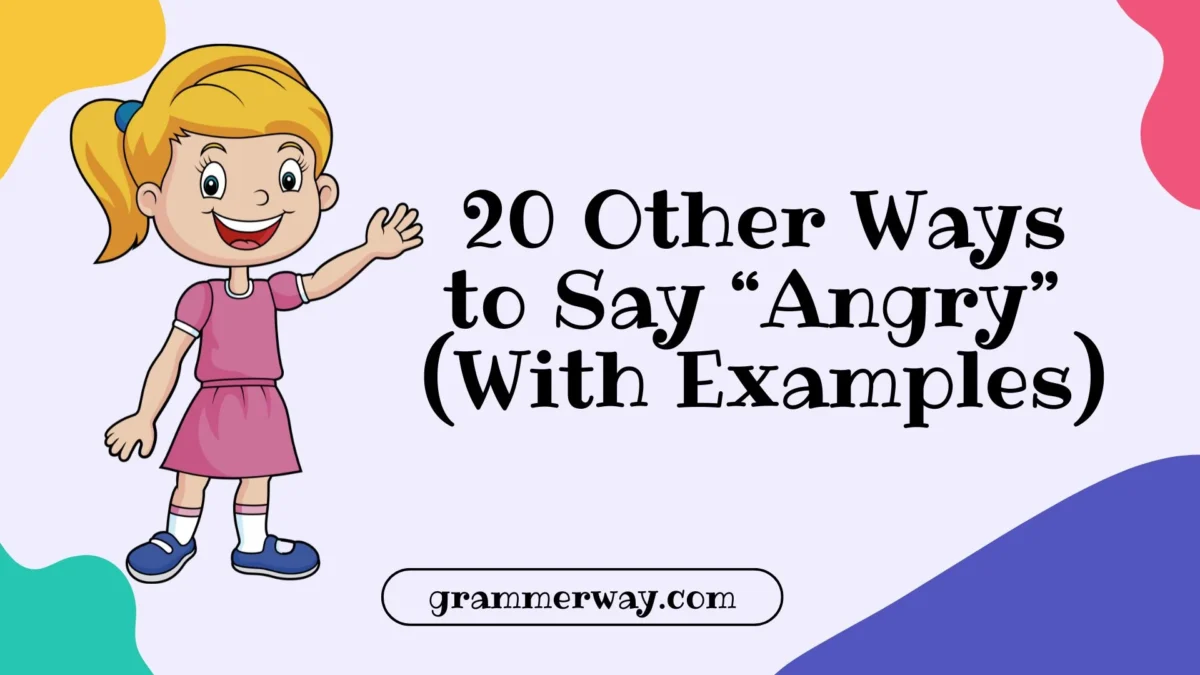
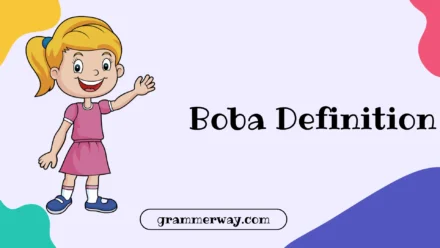
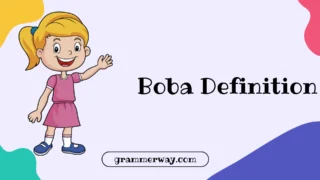
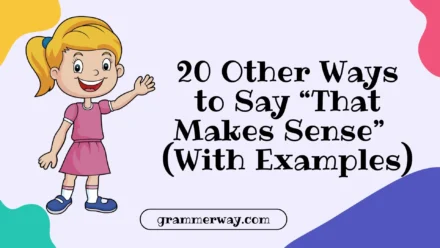
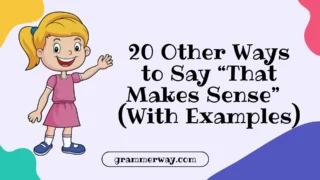


Leave a Comment